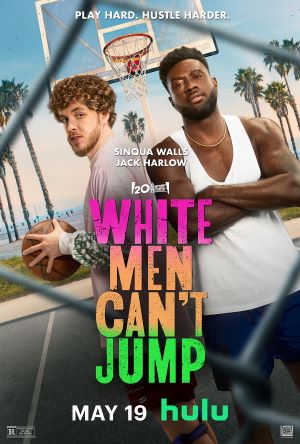

[Rating: Rock Fist Way Down]
Streaming on Hulu May 19.
A joyless, unfocused, and utterly uninspired remake of a movie that had all of that to spare, White Men Can’t Jump (2023) should have stayed on Hulu’s bench. Devoid of cultural relevance by way of its social commentary, sporting action, or humor, the movie also doesn’t have much in its leads, whose lack of chemistry is matched only by the movie’s non-existent enthusiasm for them (and basketball). Less of a sports buddy-comedy and more of a character study of two people with none to speak of, this one is a brick.
A cold open flashback introduces high school basketball phenom Kamal (Sinqua Walls), whose promising career is cut short by an off-screen incident that sees him hustling at gyms for spare change when he’s not working as a delivery driver a decade later. Kamal runs into the ostentatious Jeremy (Jack Harlow) during one such courtside shakedown, where the latter fleeces the former of $300 in a shooting contest. Jeremy’s long pants, detox juice, and socks/sandals combo mask his seasoned basketball history at Gonzaga, where a double ACL injury cut his career short (though not his desire to play).
Both men hide their court hustling (among other indiscretions) from their partners, yet each justifies it by hanging their hopes on a return to professional ball (and a potential better life for their families). Kamal pitches a partnership hustling at local courts to cover the buy-in for a two-on-two tournament, where victory could solve both his and Jeremy’s financial and personal problems. The pursuit also teases at a return to professional basketball for both men, which seems to be more important to them than the money and any relationship stability combined.

The basic outline of the film matches the 1992 version with just a few changes to the main characters and their backstories, so what doesn’t work about this movie has everything to do with the execution rather than the conceit. For starters, the interplay between Walls and Harlow is flat, humorless, and about as exciting as a job interview. The script admirably tries to give the audience something to care about with both, whether it is a pill problem or fatherhood troubles, yet too often these issues and their collateral damage become the focus of a story that should be about how fun it is to play (and be around) basketball.
And speaking of basketball: director Calmatic and the script treat the activity like a chore, or the vegetables that must be choked down to get to the next course. Like he did with Bull Durham and Tin Cup, director Ron Shelton imbued White Men Can’t Jump (1992) with a joie de vivre about the sport that celebrated the eccentricities and rough edges of the game. His version used basketball as a canvas upon which he sketched out and revealed the character of the leads and the world they occupied. This newest take on the material leans too heavily on two dudes whose dribbling and shooting is an afterthought to their shitty drama and unsuccessful comedy routines.

More than anything, though, the original brought the audience into the world of the sport, allowing them to feel like insiders amongst experts whose esoteric ball-speak was just familiar enough to remain accessible. Shelton’s use of basketball retained the fun while also making fans of all degrees feel like they could engage in the action, while Calmatic keeps everything largely clinical on a visual and emotional level.
The original also found a way to address issues of class and race without muddling the tone of the picture, which succeeded in remaining light throughout. Released a month before the Rodney King verdict, the 1992 version floated on a cloud of early-90s optimism that presumed the worst parts of this struggle were in the past. This allowed Wesley Snipes, Woody Harrelson, and the movie the freedom to riff on a seemingly harmless series of stereotypes without treading too deeply into the implications behind them.
This new reboot inherits the name of its predecessor, and is forced to tread a similar thematic path, yet Jeremy’s clunky ramblings to Kamal about the latter’s assumptions/underestimation of white players fails to capture the humor or the relevancy this topic. And that’s fitting, too, because that sums up pretty much everything wrong with this remake, which fails to replicate (and doesn’t seem to understand) any of the factors that made the 1992 version successful. The chemistry between the leads can be measured in micro-units, the on-screen action is dull, the pacing is stilted, none of it is fun (or funny), and the movie has nothing to say.





Comments on this entry are closed.